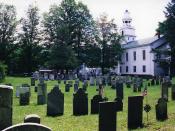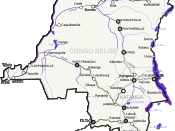By moving Nathan Price, a missionary from Georgia, and his wife and four children to the Belgian Congo, Kingsolver offers a backdrop that demonstrates the flaws in America's society, especially their religious attitudes and political ideologies at a time when the Congo was seeking its independence. Kingsolver described her novel as a "political allegory"1, and the family as a whole demonstrate this, while individual characters, such as Nathan and Rachel Price more obviously act to criticise American society, laying bare the flaws in America's attitude towards colonialism and politics in their struggle against Communism. Many have observed "The Poisonwood Bible" to be a story about people, culture and conflict and specifically, "cultural imperialism and post-colonial history"2, regardless of the African setting.
In a more general sense, "The Poisonwood Bible" demonstrates the inaccurate assumptions of the white American family. We can see this in the first book "The Things we Carried", where Leah states that they "came from Bethlehem, Georgia, carrying Betty Crocker cake mixes into the jungle".
This already suggests the inappropriateness of the items the family chose to take to the Congo, and they soon find them to be difficult to carry there, and useless once they arrive, even the Betty Crocker mix cannot be used as the humidity ruins it, a symbol of the misunderstanding between the two cultured, and also possibly a comment on how America misunderstood the Congo in terms of colonising the place.
The novel can be seen to show the small circumstances of the characters' lives as casting light on bigger events that happen throughout the world. The Price family journey to Africa carrying with them their set beliefs on religion, technology and politics. Similarly, industrialised nations attempt to impose their beliefs onto smaller, developing countries, in what Kingsolver describes as...


